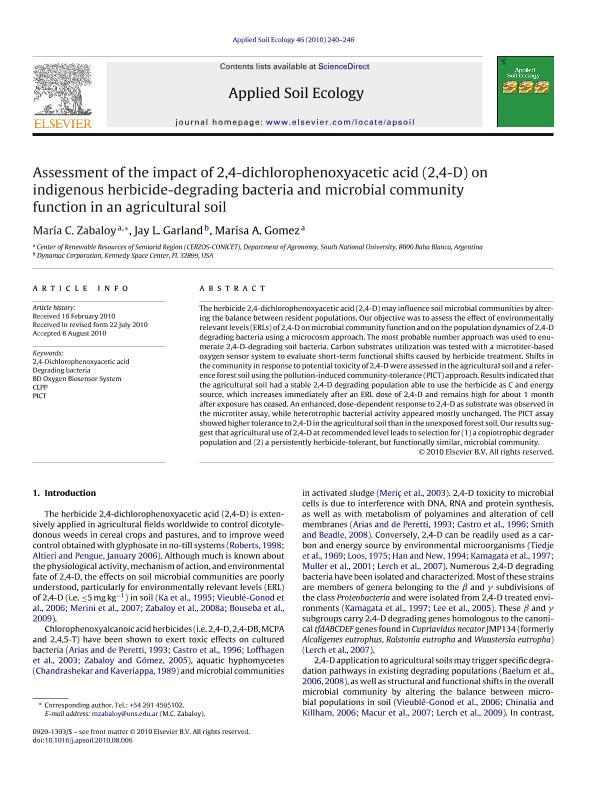Artículo
Assessment of the impact of 2,4-dichlorophenoxyacetic acid (2,4-D) on indigenous herbicide-degrading bacteria and microbial community function in an agricultural soil
Fecha de publicación:
10/2010
Editorial:
Elsevier Science
Revista:
Applied Soil Ecology
ISSN:
0929-1393
Idioma:
Inglés
Tipo de recurso:
Artículo publicado
Clasificación temática:
Resumen
The herbicide 2,4-dichlorophenoxyacetic acid (2,4-D) may influence soil microbial communities by altering the balance between resident populations. Our objective was to assess the effect of environmentally relevant levels (ERLs) of 2,4-D on microbial community function and on the population dynamics of 2,4-D degrading bacteria using a microcosm approach. The most probable number approach was used to enumerate 2,4-D-degrading soil bacteria. Carbon substrates utilization was tested with a microtiter-based oxygen sensor system to evaluate short-term functional shifts caused by herbicide treatment. Shifts in the community in response to potential toxicity of 2,4-D were assessed in the agricultural soil and a reference forest soil using the pollution-induced community-tolerance (PICT) approach. Results indicated that the agricultural soil had a stable 2,4-D degrading population able to use the herbicide as C and energy source, which increases immediately after an ERL dose of 2,4-D and remains high for about 1 month after exposure has ceased. An enhanced, dose-dependent response to 2,4-D as substrate was observed in the microtiter assay, while heterotrophic bacterial activity appeared mostly unchanged. The PICT assay showed higher tolerance to 2,4-D in the agricultural soil than in the unexposed forest soil. Our results suggest that agricultural use of 2,4-D at recommended level leads to selection for (1) a copiotrophic degrader population and (2) a persistently herbicide-tolerant, but functionally similar, microbial community.
Archivos asociados
Licencia
Identificadores
Colecciones
Articulos(CERZOS)
Articulos de CENTRO REC.NAT.RENOVABLES DE ZONA SEMIARIDA(I)
Articulos de CENTRO REC.NAT.RENOVABLES DE ZONA SEMIARIDA(I)
Citación
Zabaloy, Maria Celina; Garland, Jay L.; Gómez, Marisa Anahi; Assessment of the impact of 2,4-dichlorophenoxyacetic acid (2,4-D) on indigenous herbicide-degrading bacteria and microbial community function in an agricultural soil; Elsevier Science; Applied Soil Ecology; 46; 2; 10-2010; 240-246
Compartir
Altmétricas




